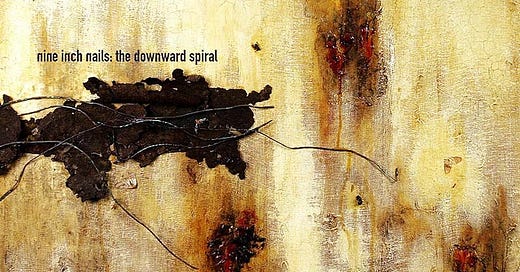As June closes, so closes 1990s month here; we will be looking at the 2000s in July, so stay alert, fans of The Strokes, The Arctic Monkeys and Blur.
Nine Inch Nails’ second album, The Downward Spiral, has a narrative that does just that. It was recorded as lead singer Trent Reznor struggled with substance abuse and depression. This concept album chronicles a man's journey as he plunges into the depths of misanthropy, culminating in his harrowing point of suicidal despair. The closing song, ‘Hurt’, channels the inner turmoil and emotions, the raw pain and self-reflection and serves as a poignant closing chapter to the album. The album was recorded at Le Pig, the home studio that Reznor had set up at 10050 Cielo Drive - a house more famous, well infamous, thanks to its previous owner Sharon Tate and what happened there.
What sets ‘Hurt’ apart from the rest of The Downward Spiral is that the song is much more minimalist than the aggressive, electronic rock that precedes it. ‘Hurt’ starts as a soft, sparse, haunting arrangement with a simple piano line, a steady, pulsing beat, and Reznor’s near-whispered opening vocals. Over six minutes Reznor and producer Flood layer more noise on top of the starting point before the song, reaching a cacophonous peak, collapses into a climactic, echoing piano note to close the album.
Lyrically, the song externalises a wealth of internal issues and anguish - self-loathing, regret and existential despair are all there, first under the surface and then out in the open. The whole album outlines a man’s descent into nihilism and destruction, ‘Hurt’ is merely the confession at the end of an hour of build-up.
The song captures the profound anguish - it recognises the pain and suffering caused to oneself and others. It is also a quiet reflection compared to the other tracks, and you can’t doubt the sincerity, which is almost heartbreaking at times as Reznor sings of everyone he knows going away in the end.
The song was released as a promo single for the album in the spring of 1995, after ‘Closer’, ‘Piggy’ and ‘Burn’ and within a year, was nominated for a Grammy for Best Rock Song, alongside Bob Dylan, Bono and Neil Young - polls and lists of the best songs by Nine Inch Nails routinely place it close to the top. It helps solidify the band’s reputation of capturing the rawest emotions into deep emotional songs that stir the soul.
There was more to come after the turn of the century in cementing the song’s legacy, and no, I’m neither talking about its usage on Rick & Morty or Leona Lewis’s cover. Legendary country singer Johnny Cash covered the song for his fourth album in his series produced by Rick Rubin, American IV: The Man Comes Around.
Taking a leaf out of the band’s book, Cash’s cover begins with an acoustic guitar but doesn’t build into chaos; it stands alone as not a young man struggling with addiction to heroin and depression but of an older man, reflecting regretfully on mortality and how little time left he has. The video, directed by frequent NIN collaborator Mark Romanek, uses the contrast between the exhibits of Cash’s Museum and the barren, run-down state it was in, and has been acclaimed as one of the greatest of all time. Cash, of course, wasn’t just singing about death’s door; he was fast approaching it.
Reznor spoke to Alternative Press in 2004 about the cover;
A few weeks later, a CD shows up with the track. Again, I'm in the middle of something and put it on and give it a cursory listen. It sounded... weird to me. That song in particular was straight from my soul, and it felt very strange hearing the highly identifiable voice of Johnny Cash singing it. It was a good version, and I certainly wasn't cringing or anything, but it felt like I was watching my girlfriend f**k somebody else. Or something like that. Anyway, a few weeks later, a videotape shows up with Mark Romanek's video on it. It's morning; I'm in the studio in New Orleans working on Zack De La Rocha's record with him; I pop the video in, and... wow. Tears welling, silence, goose-bumps... Wow. I just lost my girlfriend, because that song isn't mine any more. Then it all made sense to me. It really made me think about how powerful music is as a medium and art form. I wrote some words and music in my bedroom as a way of staying sane, about a bleak and desperate place I was in, totally isolated and alone. Some-f**king-how that winds up reinterpreted by a music legend from a radically different era/genre and still retains sincerity and meaning – different, but every bit as pure. Things felt even stranger when he passed away. The song's purpose shifted again. It's incredibly flattering as a writer to have your song chosen by someone who's a great writer and a great artist.
When Cash passed away in 2003, the song took on yet another layer of significance, further emphasising its transformative power.
The Run Out Grooves Infinite Loops
If you enjoyed this entry, maybe you’ll be interested in our first-ever entry from back in 2021 on Nirvana’s final studio album.
All in all is all we are
For a band as famous and influential as Nirvana, there’s never been a definitive goodbye as a piece of musical output. In Utero is, of course, their third and final studio album, but it doesn’t function in the way a planned last album or something like Joy Division’s






I always find the NiNs version a let down compared to the great Johnny C version (and the even better video), glad they wrote it though!